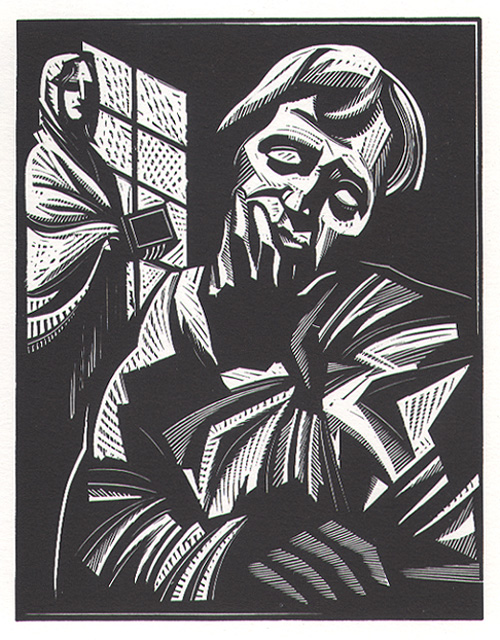
Long before the phrase "hooker with a heart of gold" had entered into the American lexicon, Dostoevsky wrote Crime and Punishment with Sofya Semyonovna Marmeladov as your proto-hooker. However, her story might be a little less sanitary than your average Hollywood tart; she chooses to become a prostitute by profession since her father is a drunk who can't hold a job down, her mother is suffering from consumption and as a result her younger siblings are going hungry. Certainly no R-rated T and A here but nonetheless her plight is a bit of a downer.
Crime and Punishment is the latest Dostoevsky novel that I'm re-reading and as with The Brothers Karamazov before it, I'm getting a lot more out of the book the second time around. The novel features the story of Raskolnikov (which comes from the Russian word raskoknik and translates to schismatic), a young man who, as a matter of practicality, takes justice into his own hands and commits murder against a woman who by his judgment is deserving of such a fate.
What unfolds is the story of Raskolnikov's tribulation, regeneration and eventual repentance. I won't even attempt to give a recap to the books many events, which includes a crazed dream in which an angry mob beats an old horse to death with a crowbar, as well as a particularly moving scene (portrayed in the picture above) in which the Gospel story of Jesus' raising of Lazarus is read to Raskolnikov by Sofya. Suffice it to say that the themes of human depravity and hope in the midst of suffering are fully explored in the novel (one of Dostoevsky's many achievements is his ability to relate such widely ranging events without seeming to make compromises designed to serve a particular idealogy - each event unwinds naturally in an authentic and unforced manner).
Raskolnikov is a character that I can relate to. I believe that part of the human condition is our struggle to make sense of events that unfold in our lives or the lives of others that offend our own concept of justice. And it is a fine line between authentically expressing our suffering and becoming angry and bitter as a result of it. Raskolnikov responds to the absence of his own concept of justice (and God) by protesting against it in the act of murder. Intrinsically tied up in this protest is Raskolnikov's infatuation with his own ego: he fancies himself to be an elite member of society who transcends human law and is thereby allowed to commit heinous acts such as murder as long as they are in service of the greater good of society. Sound crazy? Yeah, it does to me as well. It also hits a little too close to home.
I have often thought of repentance primarily in terms of negation; repentance is a word that conjures up all kinds of images and for me they are mostly negative. I've blogged about the subject of repentance before but it is something that I am returning to again and again - the concept of repentance not primarily in negative language as I had perceived it before, but positive. I can't say it better than Bishop Kallistos Ware:
"Correctly understood, repentance is not negative but positive. It means not self-pity or remorse but conversion, the re-centering of our whole life upon the Trinity. It is not looking backward with regret, but forward with hope - not downwards at our shortcomings but upwards at God's love. It is to see, not what we have failed to be, but by what by divine grace we can become; and it is to act upon what we see. To repent is to open our eyes to the light. In this sense, it is not a single act, an initial step, but a continuing state, an attitude of the heart and will that needs to be ceaselessly renewed up to the end of life (Ware, The Orthodox Way).In the novel Raskolnikov is not demonized - he is a character who in reality is quite sensitive and very concerned with the injustices committed against his neighbors in the world around him. However, he sins against God in turning to inner despair (negation in the form of murder) as a result of these perceived injustices. I think that this inner despair can often take more subtle forms than murder, perhaps even outwardly looking like Godliness but in reality may simply be a mask for our rampant pride and ego. In the end, what Raskolnikov felt would be an act of practicality to improve the world accomplished no such thing and was destructive to his own soul and person. It is only through a positive act (i.e. repentance - which authentically deals with the negative, our sin) that Raskolnikov begins the process of redemption to his soul and person.